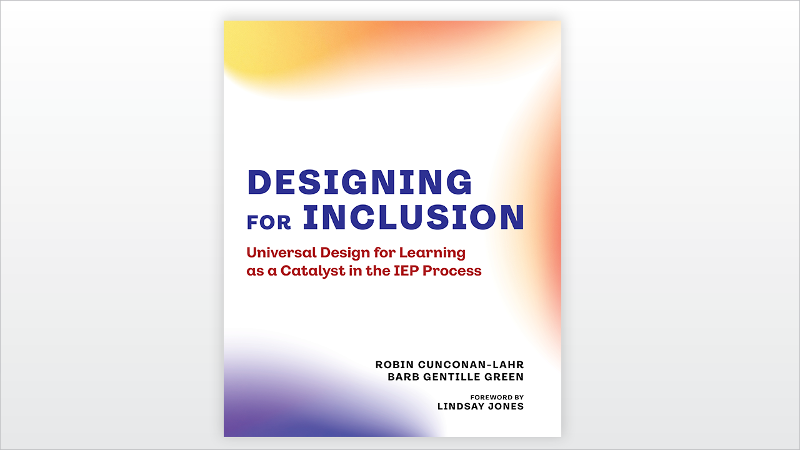Designing for Inclusion: Universal Design for Learning as a Catalyst in the IEP Process
Robin Cunconan-Lahr & Barb Gentille Green
Foreword
Lindsay Jones
2024

Available Now!
Paperback
$34.00 (ISBN: 9781943085224)
EPUB
$34.00 (ISBN: 9781943085231)
About the Book
In Designing for Inclusion, Robin Cunconan-Lahr and Barb Gentille Green offer Individualized Education Programs (IEP) team members-including educators, school administrators, caregivers and families, and students themselves-a set of resources to design the best IEPs possible.
They empower team members by providing essential background knowledge of the landmark special education laws that have established students' civil rights to a free and appropriate public education, which includes access to the general education curriculum. They then show how team members can leverage the research-based framework of Universal Design for Learning (UDL) to ensure that every student with disabilities has a full and valued presence and participation in inclusive learning communities.
In a "Gathering Room" at the end of each chapter, the authors offer guiding questions and places to write so that team members can collect their thoughts, promote collaboration, and reimagine what inclusion truly means.
Learn more by downloading a PDF of the Foreword and Introduction from the book.
Designing for Inclusion: Universal Design for Learning as a Catalyst in the IEP Process is available in paperback ($34.00, 168 pages, ISBN: 9781943085224) and accessible EPUB ($34.00, ISBN: 9781943085231) format.
About the Authors
Robin Cunconan-Lahr, Esq. is an attorney and educator focusing her work on disability rights advocacy. She has spent most of her legal career assisting families and students with disabilities in matters of special education law ensuring their rights under the IDEA. She also works to effectuate disability policy that impacts laws, attitudes, and systems change in order to create and sustain equitable and inclusive practices. Robin’s work in higher education concentrates on preparing students who are on a career pathway to becoming educators. Through teaching and consulting, she informs and models the UDL framework to both current and future practitioners in the field, including those working in early childhood or school-age classrooms.
Connect with Robin at innovatingforjusticelegal.com, on LinkedIn, or follow her on X at @RCunconanLahr.
Barb Gentille Green, M.Ed. has devoted her career to advocating for students with disabilities, promoting inclusive educational systems. After rediscovering UDL in 2013 and recognizing its potential in designing inclusive environments, she began to provide professional learning experiences for educators, both locally and nationally, in order to equip them with the knowledge and tools needed to implement inclusive practices in their classrooms. Barb is one of the hosts of the popular #UDLchat on Twitter and a cohost of “10 Minutes with Barb and Ron” through OCALI. These videos serve as a valuable resource for educators seeking practical guidance on imple-menting UDL principles in their teaching practices. Barb firmly believes in the power of embedding UDL into conversations and practice whenever possible.
Connect with Barb on LinkedIn, or follower her on X at @BGentilleGreen.
Table of Contents
- Foreword by Lindsay Jones (View Foreword and Introduction as PDF)
- Introduction
- Part A - The Educational Right to Inclusion
- Chapter 1: History and Overview of Special Education Law
- Chapter 2: Unpacking Key Concepts from the IDEA
- Chapter 3: Significant Court Cases and How They Impact IEP Team Practices.
- Part B - Inclusive Practices: UDL Premises and Principles
- Chapter 4: Introducing Universal Design for Learning
- Chapter 5: UDL Implications for IEP Teams: The Inclusive Mindset
- Part C - Inclusion: Action Through UDL
- Chapter 6: UDL Solutions to Support Inclusive Practices
- Chapter 7: Making an Inclusive Community by Honoring Voice
- Afterword: A Final Gathering
- Acknowledgments
- References
- Index
- About the Authors
More from CAST Publishing

Universal Design for Learning: Theory and Practice
This look at UDL includes contributions from CAST's research and implementation teams, as well as their collaborators in schools, universities, and research settings.
A. Meyer, D. H. Rose, & D. Gordon
2014

Quality Indicators for Assistive Technology: A Comprehensive Guide to Assistive Technology Services
Filled with information and supports such as self-evaluation matrices, suggested activities, checklists, and other helpful tools, Quality Indicators for Assistive Technology is a powerful resource for those seeking to ensure that quality AT services are provided.
QIAT Leadership Team
2015

Leading the Way to Excellence in AT Services: A Guide for School Administrators
Leading the Way to Excellence in AT Services is designed to help administrators identify critical issues and specific actions that will influence the provision of excellent assistive technology (AT) devices and services.
G. Bowser & P. R. Reed
2018
